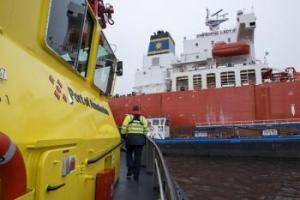Harbour Master
Harbour Masters
Worldwide there are approximately 3,000 merchant ports and the work of the Harbour Master can vary widely from country to country and from port to port even within the same country.

Harbour Masters may be recognised as the competent authority in the enforcement of port maritime and nautical legislation and therefore may have legal powers. Powers that they exercise in the enforcement of laws or port bylaws may include powers of inspection and detention. Harbour Masters should be fully aware of the extent of their powers and under which legislation they apply.
Harbour Masters may have powers to detain a vessel and will be consulted when a vessel detention is considered.
Some countries may give port state control duties to Harbour Masters.
When a ship enters a port, it must declare to the customs organisation, at least 24 hours before arrival, the cargo (cargo manifest), the stores on board and the belongings of the crew. Similarly, the passenger and crew list has to be sent to the immigration office before arrival. This is regulated by the IMO Convention on Facilitation of International Maritime Traffic (IMO FAL convention). During the stay in port, a ship can take on stores, discharge waste, change crew and disembark or embark passengers. All these operations have to be declared to the customs and the immigration authorities, both of which will need to give clearance before the ship departs.
The IMO’s International Maritime Dangerous Goods Code governs the carriage of dangerous goods by ships. The handling of dangerous goods on port premises is governed by national regulations. The handling of dangerous goods is part of the day-to-day business of ports and depending on local arrangements may be the Harbour Master's responsibility. While some ports or terminals are specialised in handling dangerous goods in bulk, the majority of ports and terminals may handle dangerous goods in smaller packaged quantities.
The safe stowage of dangerous goods on board ships as well as on terminal premises has to be controlled. Risk assessments have to be conducted and proper response strategies have to be developed in co-operation with, for instance, the fire brigade and handling terminals.
In the past, port security was concerned with deterring theft, the passage of illegal immigrants and countering smuggling and contraband. Some smaller ports had no security measures of any significance. Other, larger ports, had their own security personnel.
In other countries, ports were considered military installations and security was an integral part of their management.
This changed in the light of the 9/11 attacks in the USA in 2001. The International Ship and Port Facility Security Code (ISPS Code) was agreed in 2002, came into force in 2004, and is a comprehensive set of measures to enhance the security of ships and port facilities based on risk management that determines what security measures are appropriate.
The International Ship and Port Facility Security Code (ISPS Code) is intended to provide improved protection from terrorist attacks for all port facilities receiving seagoing ships larger than 500 Gross Ton on international routes.
The ISPS Code, the 2012 Guide and other IMO publications are available for purchase at IMO's Catalogue & Book Code List.
In many ports the Harbour Master is also the Port Security Officer (PSO) and members of the marine team may be Port Facility Security Officers (PFSOs) and have obligations under the ISPS Code. Many ports have facilities within their area of jurisdiction and these facilities will have their own Security Plans. Irrespective of whether the Harbour Master is the port security officer or not, he or she will need to be fully aware of the requirements of the ISPS code as it applies to their port and will be involved in developing, implementing and monitoring Port Security Exercises and audits from time to time.
The Antwerp Port Authority has introduced a game with a difference, an on-line tool that seeks to create security awareness in a port as port users learn how they can make their own individual contribution towards a more safe and secure port in an entertaining way. The on-line port security game will make port users aware of their responsibility to report suspicious situations, take the correct actions and inform the right people. You can play the game on the website of the Port of Antwerp. It is also available for download on the iTunes App store for free.
Founded in 2017, MarineLabs delivers high-resolution, real-time, and historical wind, wave, and weather data, as well as hyper-local 10-day forecasting, from a growing network of cloud-connected, rugged sensor nodes.
The International Harbour Masters Association (IHMA) and the Port of Rotterdam Authority are pleased to announce the 15th International Harbour Masters Association Congress, to be held from 09–12 June 2026 at Theater Zuidplein in Rotterdam.
Join the world’s premier professional body for harbour masters and receive up-to-date information on the industry and access to the members' area of the website.